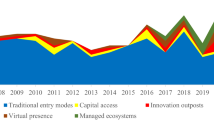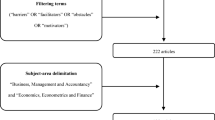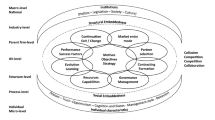Abstract
Using evolutionary game theory, this paper delves into the strategic dynamics of reverse tacit knowledge transfer within incumbent-spinout alliances. It focuses on understanding how tacit knowledge, initially inherited by spinouts from parent firms, is transferred back into a corporate entrepreneurial ecosystem. The study employs evolutionary game models to analyze strategic decisions made by incumbents and spinouts, considering factors like knowledge integration, scarcity, risk, and cultural differences in mergers and acquisitions (M&A) and alliance contexts. Key findings reveal that factors such as incumbents’ attitudes towards knowledge integration and reuse, tacit knowledge scarcity, and risk profiles significantly influence reverse transfer in M&A scenarios. Partnership matching, income distribution, and spinout knowledge sensitivity are crucial in alliance settings. The research also highlights the role of reputation loss and contract breach penalties in deterring opportunistic behavior and fostering positive strategic choices. This exploration provides valuable insights for incumbents and spinouts to optimize their reverse knowledge transfer strategies. It advances our understanding of knowledge exchange in incumbent-spinout relationships and proposes strategic guidance to foster mutually beneficial collaborations and innovation, aligning well with the evolving dynamics of knowledge economies and entrepreneurial ecosystems.


















Similar content being viewed by others
Data Availability
The datasets used and/or analyzed during the current study are available from the corresponding author on reasonable request.
References
Adamik, A., & Nowicki, M. (2019). Pathologies and paradoxes of co-creation: A contribution to the discussion about corporate social responsibility in building a competitive advantage in the age of Industry 4.0. Sustainability, 11(18), 4954.
Adams, P., Fontana, R., & Malerba, F. (2019). Linking vertically related industries: Entry by employee spinouts across industry boundaries. Industrial and Corporate Change, 28(3), 529–550.
Adams, P., Fontana, R., & Malerba, F. (2022). Knowledge resources and the acquisition of spinouts. Eurasian Business Review, 12(2), 277–313.
Adobor, H. (2020). Supply chain resilience: An adaptive cycle approach. The International Journal of Logistics Management, 31(3), 443–463.
Ahmad, F., & Karim, M. (2019). Impacts of knowledge sharing: A review and directions for future research. Journal of Workplace Learning, 31(3), 207–230.
Alkhaldi, D. A. (2018). Knowledge sharing and IT/business partnership: An integrated view of risk management. In I. Management Association (Ed.), Global business expansion: Concepts, methodologies, tools, and applications (pp. 834–851). IGI Global. https://doi.org/10.4018/978-1-5225-5481-3.ch037
AmoozadMahdiraji, H., Beheshti, M., Jafari-Sadeghi, V., & Garcia-Perez, A. (2022). What drives inter-organisational knowledge management? The cause and effect analysis using a multi-layer multi-criteria decision-making framework. Journal of Knowledge Management, 26(9), 2195–2221.
Arias-Pérez, J., Lozada, N., & Henao-García, E. (2020). When it comes to the impact of absorptive capacity on co-innovation, how really harmful is knowledge leakage? Journal of Knowledge Management, 24(8), 1841–1857.
Azeem, M., Ahmed, M., Haider, S., & Sajjad, M. (2021). Expanding competitive advantage through organizational culture, knowledge sharing and organizational innovation. Technology in Society, 66, 101635.
Bae, J., & Lee, J. M. (2021). How technological overlap between spinouts and parent firms affects corporate venture capital investments in spinouts: The role of competitive tension. Academy of Management Journal, 64(2), 643–678.
Bahoo-Torodi, A., & Torrisi, S. (2022). When do spinouts benefit from market overlap with parent firms? Journal of Business Venturing, 37(6), 106249.
Balasubramanian, N., & Sakakibara, M. (2023). Incidence and performance of spinouts and incumbent new establishments: Role of selection and redeployability within parent firms. Strategic Management Journal, 44(10), 2460–2488.
Barrett, G., Dooley, L., & Bogue, J. (2021). Open innovation within high-tech SMEs: A study of the entrepreneurial founder’s influence on open innovation practices. Technovation, 103, 102232.
Berry, H. (2015). Knowledge inheritance in global industries: The impact of parent firm knowledge on the performance of foreign subsidiaries. Academy of Management Journal, 58(5), 1438–1458.
Bhardwaj, B. (2019). Role of knowledge management in enhancing the entrepreneurial ecosystems through corporate entrepreneurship and strategic intent in high-tech firms. Journal of the Knowledge Economy, 10, 1831–1859.
Bierly, P. E., III., & Gallagher, S. (2007). Explaining alliance partner selection: Fit, trust and strategic expediency. Long Range Planning, 40(2), 134–153.
Bodlaj, M., Kadic-Maglajlic, S., & Vida, I. (2020). Disentangling the impact of different innovation types, financial constraints and geographic diversification on SMEs’ export growth. Journal of Business Research, 108, 466–475.
Calipha, R., Brock, D. M., Rosenfeld, A., & Dvir, D. (2018). Acquired, transferred and integrated knowledge: A study of M&A knowledge performance. Journal of Strategy and Management, 11(3), 282–305.
Campbell, B. A., Ganco, M., Franco, A. M., & Agarwal, R. (2012). Who leaves, where to, and why worry? Employee mobility, entrepreneurship and effects on source firm performance. Strategic Management Journal, 33(1), 65–87.
Chen, H., BaptistaNunes, M., Ragsdell, G., & An, X. (2018). Extrinsic and intrinsic motivation for experience grounded tacit knowledge sharing in Chinese software organisations. Journal of Knowledge Management, 22(2), 478–498.
Cheng, J., Chelliah, S., & Teoh, A. P. (2021). The effect of subsidiary characteristics on efficiency in knowledge transfer between multinational companies. Journal of Entrepreneurship, Business and Economics, 9(1), 230–274.
Chila, V., & Martin, X. (2018). Expanding horizons? Effects of spin-outs on parents’. In Academy of Management Proceedings (Vol. 2018, No. 1, p. 15309) technological positions. Briarcliff Manor, NY 10510: Academy of Management.
Cirillo, B. (2019). External learning strategies and technological search output: Spinout strategy and corporate invention quality. Organization Science, 30(2), 361–382.
Corsino, M., Giuri, P., & Torrisi, S. (2019). Technology spin-offs: Teamwork, autonomy, and the exploitation of business opportunities. The Journal of Technology Transfer, 44(5), 1603–1637.
Costa, C., & Baptista, R. (2023). Knowledge inheritance and performance of spinouts. Eurasian Business Review, 13(1), 29–55.
Fischer, B., Guerrero, M., Guimón, J., & Schaeffer, P. R. (2021). Knowledge transfer for frugal innovation: Where do entrepreneurial universities stand? Journal of Knowledge Management, 25(2), 360–379.
Franco, A. M., & Filson, D. (2006). Spin-outs: Knowledge diffusion through employee mobility. The Rand Journal of Economics, 37(4), 841–860.
Friedman, D. (1991). Evolutionary game in economics. Econometrica, 59(3), 637–666.
Furlan, A., & Grandinetti, R. (2014). Spin-off performance in the start-up phase–a conceptual framework. Journal of Small Business and Enterprise Development, 21(3), 528–544.
Fuster, E., Padilla-Meléndez, A., Lockett, N., & del-Águila-Obra, A. R. (2019). The emerging role of university spin-off companies in developing regional entrepreneurial university ecosystems: The case of Andalusia. Technological Forecasting and Social Change, 141, 219–231.
Gaonkar, S., & Moeen, M. (2023). Standing on the parent’s shoulder or in its shadow? Alliance partner overlap between employee spinouts and their parents. Strategic Management Journal, 44(2), 415–440.
Gavidia-Calderon, C., Sarro, F., Harman, M., & Barr, E. T. (2020). Game-theoretic analysis of development practices: Challenges and opportunities. Journal of Systems and Software, 159, 110424.
Ge, B., & Campopiano, G. (2022). Knowledge management in family business succession: Current trends and future directions. Journal of Knowledge Management, 26(2), 326–349.
Guckenbiehl, P., de Zubielqui, G. C., & Lindsay, N. (2021). Knowledge and innovation in start-up ventures: A systematic literature review and research agenda. Technological Forecasting and Social Change, 172, 121026.
Hoang, G., Le, T. T. T., Tran, A. K. T., & Du, T. (2020). Entrepreneurship education and entrepreneurial intentions of university students in Vietnam: The mediating roles of self-efficacy and learning orientation. Education Training, 63(1), 115–133.
Kabir, M. N. (2019). Knowledge-based social entrepreneurship: Understanding knowledge economy, innovation, and the future of social entrepreneurship. Springer.
Kastampolidou, K., & Andronikos, T. (2020). A survey of evolutionary games in biology. GeNeDis 2018: Computational Biology and Bioinformatics, 253–261. https://doi.org/10.1007/978-3-030-32622-7_23
Kean Yew, L. (2023). From family firm to Japanese OEM in tacit knowledge innovation: A case study of Sin Kwang plastic resources in Malaysia. Journal of Organizational Change Management, 36(6), 966–984.
Kim, J., Paek, B., & Lee, H. (2022). Exploring innovation ecosystem of incumbents in the face of technological discontinuities: Automobile firms. Sustainability, 14(3), 1606.
Klepper, S., & Sleeper, S. (2005). Entry by spinoffs. Management Science, 51(8), 1291–1306.
Kötting, M. (2020). Corporate incubators as knowledge brokers between business units and ventures: A systematic review and avenues for future research. European Journal of Innovation Management, 23(3), 474–499.
Kuhlmann, M., Bening, C. R., & Hoffmann, V. H. (2023). How incumbents realize disruptive circular innovation-Overcoming the innovator’s dilemma for a circular economy. Business Strategy and the Environment, 32(3), 1106–1121.
Lange, S., & Wagner, M. (2021). The influence of exploratory versus exploitative acquisitions on innovation output in the biotechnology industry. Small Business Economics, 56, 659–680.
Liu, W., & Yang, J. (2018). The evolutionary game theoretic analysis for sustainable cooperation relationship of collaborative innovation network in strategic emerging industries. Sustainability, 10(12), 4585.
Lopes, J. M., Oliveira, M., Lopes, J., & Zaman, U. (2021). Networks, innovation and knowledge transfer in tourism industry: An empirical study of SMEs in Portugal. Social Sciences, 10(5), 159.
Meng, D., Li, X., & Rong, K. (2019). Industry-to-university knowledge transfer in ecosystem-based academic entrepreneurship: Case study of automotive dynamics & control group in Tsinghua University. Technological Forecasting and Social Change, 141, 249–262.
Mudambi, R., Piscitello, L., & Rabbiosi, L. (2014). Reverse knowledge transfer in MNEs: Subsidiary innovativeness and entry modes. Long Range Planning, 47(1–2), 49–63.
Munjal, S., Andersson, U., Pereira, V., & Budhwar, P. (2021). Exploring reverse knowledge transfer and asset augmentation strategy by developed country MNEs: Case study evidence from the Indian pharmaceutical industry. International Business Review, 30(6), 101882.
Nair, S. R., Demirbag, M., Mellahi, K., & Pillai, K. G. (2018). Do parent units benefit from reverse knowledge transfer? British Journal of Management, 29(3), 428–444.
Ni, G., Zhang, Z., Yuan, Z., Huang, H., Xu, N., & Deng, Y. (2022). Transformation paths and influencing factors of tacit knowledge into explicit knowledge in real estate companies: A qualitative study. Engineering, Construction and Architectural Management, 29(3), 1319–1342.
O’Connor, G. C. (2008). Major innovation as a dynamic capability: A systems approach. Journal of Product Innovation Management, 25(4), 313–330.
Ojaghi, H., Mohammadi, M., & Yazdani, H. R. (2019). A synthesized framework for the formation of startups’ innovation ecosystem: A systematic literature review. Journal of Science and Technology Policy Management, 10(5), 1063–1097.
Olan, F., Liu, S., Neaga, I., Chen, H., & Nakpodia, F. (2019). How cultural impact on knowledge sharing contributes to organizational performance: Using the fsQCA approach. Journal of Business Research, 94, 313–319.
Pearce, J. A., II., & Patel, P. C. (2022). Reaping the financial and strategic benefits of a divestiture by spin-off. Business Horizons, 65(3), 291–301.
Porter, M. E. (1991). Towards a dynamic theory of strategy. Strategic Management Journal, 12(S2), 95–117.
Prokop, D., Huggins, R., & Bristow, G. (2019). The survival of academic spinoff companies: An empirical study of key determinants. International Small Business Journal, 37(5), 502–535.
Rådberg, K. K., & Löfsten, H. (2023). The entrepreneurial university and development of large-scale research infrastructure: Exploring the emerging university function of collaboration and leadership. The Journal of Technology Transfer, 1–33. https://doi.org/10.1007/s10961-023-10033-x
Raffiee, J., Ganco, M., & Campbell, B. A. (2020). Better the devil you know? Examining the relationship between spinout team assembly and spinout survival. In Employee Inter-and Intra-Firm Mobility (Vol. 41, pp. 389–409). Emerald Publishing Limited. https://doi.org/10.1108/S0742-332220200000041026
Rexhepi, G., & Srhoj, S. (2018). Strategy as an ever evolving road to success of growing enterprises. World Review of Entrepreneurship, Management and Sustainable Development, 14(3), 333–347.
Sanford, S., Schwartz, B., & Khan, Y. (2020). The role of tacit knowledge in communication and decision-making during emerging public health incidents. International Journal of Disaster Risk Reduction, 50, 101681.
Sansone, G., Battaglia, D., Landoni, P., & Paolucci, E. (2021). Academic spinoffs: The role of entrepreneurship education. International Entrepreneurship and Management Journal, 17(1), 369–399.
Scaringella, L., & Radziwon, A. (2018). Innovation, entrepreneurial, knowledge, and business ecosystems: Old wine in new bottles? Technological Forecasting and Social Change, 136, 59–87.
Sears, J., & Hoetker, G. (2014). Technological overlap, technological capabilities, and resource recombination in technological acquisitions. Strategic Management Journal, 35(1), 48–67.
Shah, S. K., Agarwal, R., & Echambadi, R. (2019). Jewels in the crown: Exploring the motivations and team building processes of employee entrepreneurs. Strategic Management Journal, 40(9), 1417–1452.
Sohail, F. (2021). From employee to entrepreneur: Learning, employer size, and spinout dynamics. Journal of Economic Dynamics and Control, 133, 104270.
Steiber, A., & Alänge, S. (2021). Corporate-startup collaboration: Effects on large firms’ business transformation. European Journal of Innovation Management, 24(2), 235–257.
Stock, G. N., Tsai, J. C. A., Jiang, J. J., & Klein, G. (2021). Coping with uncertainty: Knowledge sharing in new product development projects. International Journal of Project Management, 39(1), 59–70.
True, J. L., Jones, B. D., & Baumgartner, F. R. (2019). Punctuated-equilibrium theory: Explaining stability and change in public policymaking. In Theories of the Policy Process, Second Edition (pp. 155–187). Routledge. https://doi.org/10.4324/9780367274689-6
Villalonga, B., & McGahan, A. M. (2005). The choice among acquisitions, alliances, and divestitures. Strategic Management Journal, 26(13), 1183–1208.
Walter, S. G., Heinrichs, S., & Walter, A. (2014). Parent hostility and spin-out performance. Strategic Management Journal, 35(13), 2031–2042.
Walter, S. G. (2023). Spin-outs’ knowledge legacies and parent hostility: A competitive dynamics view. Small Business Economics, 1–21. https://doi.org/10.1007/s11187-023-00849-0
Xiong, L., & King, C. (2018). Too much of a good thing? Examining how proactive personality affects employee brand performance under formal and informal organizational support. International Journal of Hospitality Management, 68, 12–22.
Xue, R., Qian, G., Qian, Z., & Li, L. (2019). Environmental turmoil and firms’ core structure dynamism: The moderating role of strategic alliances. Journal of Business & Industrial Marketing, 34(7), 1619–1638.
Yashiro, K., Lim, Y., Sengoku, S., Aoyama, A., & Kodama, K. (2024). The rise of spin-offs: Fueling pharmaceutical innovation through collaboration. Journal of Open Innovation: Technology, Market, and Complexity, 10(1), 100200. https://doi.org/10.1016/j.joitmc.2023.100200
Funding
This article has been partly funded by the National Natural Science Foundation of China (ID: 72372039).
Author information
Authors and Affiliations
Corresponding author
Ethics declarations
Conflict of Interest
The authors declare no competing interests.
Additional information
Publisher's Note
Springer Nature remains neutral with regard to jurisdictional claims in published maps and institutional affiliations.
Rights and permissions
Springer Nature or its licensor (e.g. a society or other partner) holds exclusive rights to this article under a publishing agreement with the author(s) or other rightsholder(s); author self-archiving of the accepted manuscript version of this article is solely governed by the terms of such publishing agreement and applicable law.
About this article
Cite this article
Hang, Y., Zhang, Y. The Inheritance Imperative: A Game-Theoretic Analysis of Reverse Tacit Knowledge Transfer. J Knowl Econ (2024). https://doi.org/10.1007/s13132-024-01872-6
Received:
Accepted:
Published:
DOI: https://doi.org/10.1007/s13132-024-01872-6




